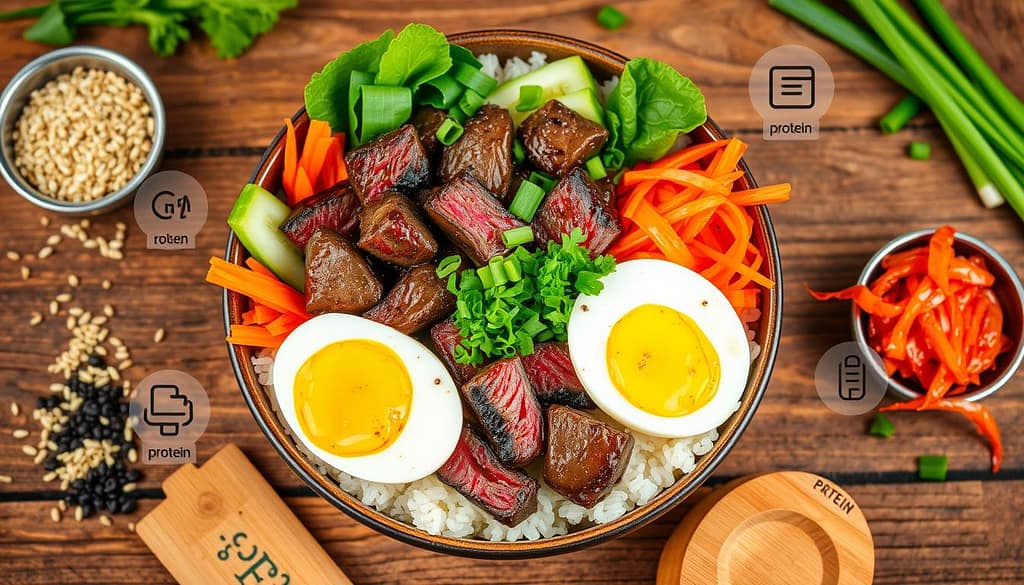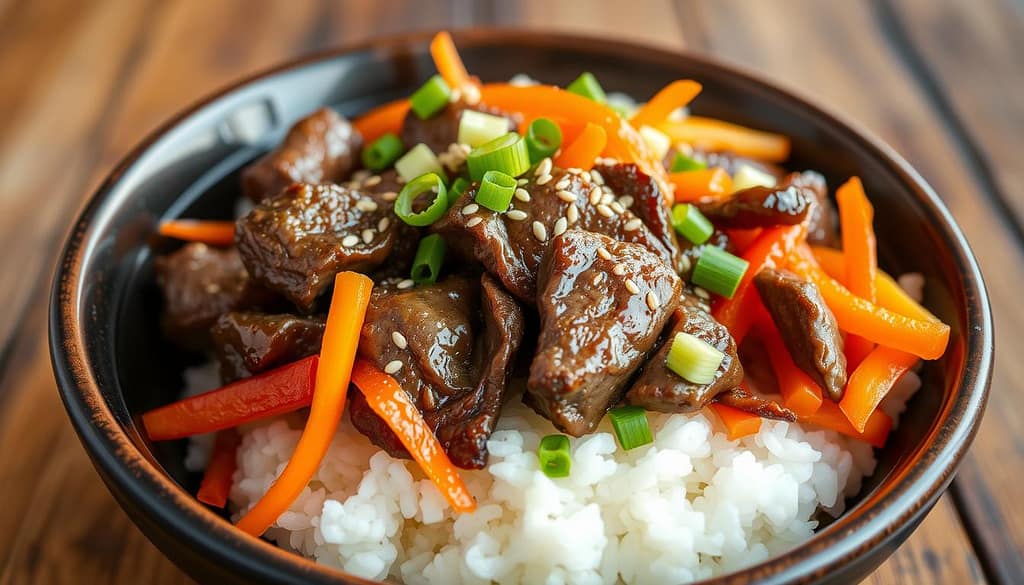Bulgogi Bowl: The Ultimate Guide to This Korean Classic
The first time I tasted a bulgogi bowl, it was like discovering a flavor symphony. My culinary journey through Korean cuisine transformed that day. I learned how a simple combination of marinated beef and rice could create such an extraordinary dining experience.
This bulgogi bowl guide is your passport to exploring an iconic Korean food tradition. It has captured hearts worldwide. As a passionate home cook, I’ve learned that the bulgogi bowl is more than just a meal. It’s a cultural experience packed with rich, complex flavors.
Korean cuisine offers incredible depth, and the bulgogi bowl stands as a perfect representation of this culinary artistry. From its tender, carefully marinated beef to the perfectly balanced rice base, each element tells a story of tradition and innovation in Korean cooking.
My goal is to demystify the bulgogi bowl, breaking down its components, techniques, and cultural significance. Whether you’re a seasoned Korean food enthusiast or a curious newcomer, this comprehensive guide will help you master the art of creating an authentic and delicious bulgogi bowl right in your own kitchen.
Table of Contents
What is a Bulgogi Bowl?
The bulgogi bowl is a tasty mix of Korean flavors and modern eating. It turns the classic bulgogi recipe into a full meal. This dish is both filling and healthy.
This dish is more than food; it’s an experience. It combines tender meat, cooked rice, and colorful toppings. Let’s explore what makes this Korean dish special.
Understanding the Origins of Bulgogi
Bulgogi has a long history in Korean cooking. Literally meaning “fire meat”, it started in the Goguryeo era. Meat was grilled over an open flame back then.
The method of slicing beef thinly and marinating it became key in Korean food.
Key Ingredients in a Bulgogi Bowl
- Thinly sliced beef (typically sirloin or tenderloin)
- Soy sauce-based marinade
- Sesame oil
- Brown sugar
- Garlic and ginger
- Steamed white rice
Popular Variations of Bulgogi
| Variation | Meat Type | Unique Characteristic |
|---|---|---|
| Classic Beef Bulgogi | Sirloin | Traditional marinade |
| Chicken Bulgogi | Chicken breast | Lighter protein option |
| Pork Bulgogi | Pork shoulder | Slightly sweeter flavor |
“Bulgogi is not just a dish, it’s a celebration of Korean culinary tradition” – Korean Food Expert
If you love Korean food or just want to try something new, the bulgogi bowl is perfect. It brings the flavors of Seoul right to your plate.
The Perfect Bulgogi Marinade
Making a great bulgogi marinade is key to turning regular meat into a Korean dish to remember. The right sauce can make your dish go from good to amazing. It adds deep flavors and makes the meat tender and juicy.
Essential Components of the Marinade
A traditional bulgogi marinade has several important ingredients. Together, they create a rich flavor:
- Soy sauce: Adds saltiness and depth
- Brown sugar: Sweetens and caramelizes the meat
- Sesame oil: Gives a nutty taste
- Garlic: Adds a strong aroma
- Ginger: Adds a spicy touch
- Asian pear: Tenderizes the meat naturally
Recommended Marinade Recipes
I’ve found a bulgogi marinade recipe that’s perfect. Here’s what I use:
| Ingredient | Quantity |
|---|---|
| Soy sauce | ½ cup |
| Brown sugar | ⅓ cup |
| Minced garlic | 4 cloves |
| Sesame oil | 1 tablespoon |
| Grated ginger | 1 teaspoon |
How Long to Marinate
The secret to a great bulgogi marinade is time. I suggest marinating for at least 30 minutes. But for the best flavor, marinate overnight in the fridge. This lets the sauce soak deep into the meat, making each bite full of flavor.
“Patience is the key to a perfect bulgogi marinade” – Korean Culinary Tradition
Tip: For tougher meat, marinate for up to 12 hours. The enzymes from the Asian pear and the acid in the marinade break down the meat. This makes it tender and delicious.
Cooking Methods for Bulgogi
Trying out different cooking ways can make your Korean BBQ better. Each method adds special flavors and textures to bulgogi.
Grilling Bulgogi to Perfection
Grilling is the traditional way to make bulgogi. It gives the meat a nice caramelization and smoky taste. For the best results, follow these steps:
- Use a hot grill set to medium-high heat
- Cook thinly sliced beef for 1-2 minutes per side
- Ensure meat is evenly spread to promote uniform cooking
Pan-Frying Techniques
If you don’t have a grill, pan-frying is a great option. A cast-iron skillet is best for a real Korean BBQ feel.
| Technique | Cooking Time | Tips |
|---|---|---|
| Medium-High Heat | 3-5 minutes | Use 1 tablespoon oil |
| Meat Thickness | 2-3mm slices | Ensure even cooking |
Oven-Baked Bulgogi
Oven-baking is a simple way to cook bulgogi. Just spread the marinated meat on a baking sheet and bake at 425°F for 10-12 minutes.
“The key to great bulgogi is not just the method, but the marinade and quality of meat.” – Korean Culinary Expert
No matter the method, marinating for at least 4 hours will make your bulgogi taste better.
The Best Base for Your Bulgogi Bowl
Creating the perfect bulgogi bowl starts with a great base. This base should match the rich flavors of Korean food. It turns a simple meal into a culinary adventure.
Choosing the Right Rice
Rice is key in a traditional bulgogi bowl. Use medium-grain white rice or sushi rice. They soak up the savory marinade well.
These rice types make a soft, sticky base. They catch the meat’s delicious flavors perfectly.
Alternative Grains to Consider
- Quinoa: A protein-packed alternative with a nutty flavor
- Brown rice: Offers additional fiber and nutrients
- Barley: Provides a hearty, chewy texture
- Cauliflower rice: Low-carb option for health-conscious diners
Adding Vegetables for Flavor
Make your bulgogi bowl better by adding vegetables to the base. Baby bok choy is great when seared and mixed with rice. Other good choices are:
- Roasted bell peppers
- Sautéed mushrooms
- Pickled radishes
- Steamed edamame
“The secret to an amazing bulgogi bowl is balance – between grains, proteins, and vegetables.”
Pro tip: Think about nutrition when making your base. A good bulgogi bowl has 38g of carbs and 41g of protein. It’s both satisfying and healthy.
Ideal Toppings for Bulgogi Bowls
Creating the perfect bulgogi bowl is all about the toppings. They turn a simple dish into a feast for the senses. The right mix of garnishes can make your meal unforgettable.
Toppings are key to a great bulgogi bowl. They add texture, color, and flavor. Each bite becomes a joy.
Traditional Korean Garnishes
Classic Korean garnishes add authenticity to your bowl. Here are some must-haves:
- Kimchi – fermented cabbage with a tangy kick
- Sliced green onions
- Toasted sesame seeds
- Pickled radishes
Creative Topping Ideas
Try these unique topping ideas:
- Crispy fried shallots
- Fresh herb mix (mint, cilantro)
- Pickled cucumber ribbons
- Spicy gochujang sauce
Balancing Flavors with Crunch
A great bulgogi bowl needs texture balance. Crunchy bits contrast well with soft meat and rice.
| Topping | Texture | Flavor Profile |
|---|---|---|
| Roasted sesame seeds | Crispy | Nutty |
| Pickled vegetables | Crisp | Tangy |
| Crispy fried onions | Crunchy | Savory |
“The magic of a bulgogi bowl lies in its toppings – they tell a story of flavor and texture with every bite.” – Korean Culinary Expert
Don’t be afraid to mix and match toppings. Find the perfect mix for you. The best topping is the one that makes your taste buds dance!
Nutritional Benefits of Bulgogi Bowls
Korean food is known for its perfect mix of nutrition and taste. Bulgogi bowls are a great example of this. They offer a full range of nutrients that support a healthy diet and taste great.

High-Quality Protein Sources
A bulgogi bowl is packed with protein. It has about 30.9 grams of protein in each serving. This helps keep your muscles strong and supports your body’s functions.
The lean beef in bulgogi bowls gives you essential amino acids. These are key for fixing and growing your body.
Incorporating Vegetables for Health
Bulgogi bowls are more than just protein. They also have lots of vitamins and minerals from vegetables. Common veggies in these bowls include:
- Carrots (rich in Vitamin A)
- Bell peppers (high in Vitamin C)
- Cabbage (provides fiber)
- Mushrooms (offers additional nutrients)
Caloric Considerations
Knowing the calories in a bulgogi bowl helps you stick to your diet. A typical bowl has:
| Nutrient | Amount per Serving |
|---|---|
| Calories | 358 kcal |
| Carbohydrates | 14 g |
| Protein | 32 g |
| Fat | 19 g |
“A bulgogi bowl is not just a meal, it’s a nutritional powerhouse that combines taste and health in every bite.”
Choosing the right ingredients and portion sizes makes bulgogi bowls fit any diet. Whether you’re trying to keep, lose, or gain weight, they’re a great choice.
Pairing Drinks with Your Bulgogi Bowl
Finding the right drink can make your bulgogi bowl special. Korean drinks are perfect for this dish. They add to the meal’s flavor.
Traditional Korean Beverages
Traditional Korean drinks are great with bulgogi bowls. Soju, a clear alcohol, is a classic choice. Makgeolli, a rice wine, is smooth and sweet, balancing the dish’s flavors.
- Soju: Clear, crisp spirit
- Makgeolli: Milky rice wine
- Bokbunja ju: Blackberry wine with dense texture
Wine Pairings to Enhance Flavor
Wine lovers can choose wines that match the bulgogi bowl. Red wines with moderate tannins pair well with beef.
- Argentine Malbec: Spicy undertones complementing garlic
- California Zinfandel: Rich red and black fruit flavors
- Medium-bodied Merlot: Balanced flavor profile
Refreshing Non-Alcoholic Options
For those who don’t drink alcohol, Korean has great choices. Boricha, a barley tea, is light and nutty. It refreshes and aids digestion.
A well-chosen drink can transform your bulgogi bowl from a simple meal to a memorable culinary experience.
Whether you like Korean drinks, wine, or non-alcoholic options, there’s a perfect match for your bulgogi bowl. It will make your meal even better.
Where to Buy Authentic Bulgogi Ingredients
Finding the right ingredients is key for a true Korean food experience. My guide will show you the best places for your bulgogi recipe. You’ll get genuine and top-quality parts.
Local Asian Markets: A Treasure Trove of Ingredients
Start at local Asian markets for real bulgogi ingredients. These places have fresh and special items that big stores don’t. Here’s what you’ll find:
- Fresh, high-quality meat cuts
- Authentic Korean sauces and marinades
- Specialty produce like Asian pears
- Hard-to-find seasonings and spices
Online Shopping for Convenience
Online shopping is great if you can’t get to local markets. Online stores sell a wide range of Korean food ingredients. They deliver right to your door.
- Amazon Asian Food Section
- H Mart Online Store
- Specialty Korean ingredient websites
Specialty Korean Stores: The Ultimate Ingredient Haven
Specialty Korean stores have everything you need for bulgogi. They offer premium meat and unique fermented ingredients. These make your Korean dishes stand out.
“The secret to an authentic bulgogi bowl lies in sourcing the right ingredients.” – Korean Culinary Expert
When shopping, look for USDA Choice beef. It’s the best meat for bulgogi. You’ll find it in 10 lbs packs, with about 32 servings per case. This gives you lots of options for meals.
Easy Bulgogi Bowl Recipes to Try
Bringing Korean cuisine to your kitchen is easy. I’ll share great bulgogi bowl recipes to enhance your cooking.

Creating a perfect bulgogi bowl requires quality ingredients and a love for authentic flavors. Let’s explore some tasty recipes that will delight your taste buds.
Quick Weeknight Bulgogi Bowl
This recipe is perfect for busy cooks who want a tasty meal fast. Here’s what you need:
- 1.5 lbs ribeye or sirloin steak, thinly sliced
- Marinade ingredients:
- ⅓ cup soy sauce
- 2 tablespoons brown sugar
- 3 tablespoons mirin
- 4 garlic cloves, minced
- Jasmine rice for serving
- Optional toppings: green onions, sesame seeds
Classic Bulgogi Bowl Recipe
For a true bulgogi bowl experience, try this recipe. It captures traditional Korean flavors:
| Ingredient | Quantity |
|---|---|
| Beef | 1.5 lbs thinly sliced |
| Marinade Time | 4-24 hours |
| Cooking Time | 2-3 minutes per side |
| Recommended Cooking Oil | Peanut or vegetable oil |
Vegetarian-Friendly Bulgogi Bowls
I’ve created a delightful vegetarian bulgogi bowl for plant-based diets. Use tofu or seitan, marinated with traditional bulgogi sauce.
“The secret to a great bulgogi bowl is in the marinade – it’s all about balancing sweet, savory, and umami flavors!” – Korean Cuisine Expert
These bulgogi bowl recipes offer unique twists on the classic dish. They cater to all tastes, whether you love meat or prefer plant-based options. These recipes will bring the vibrant tastes of Korean cuisine to your dinner table.
Serving Suggestions for Bulgogi Bowls
Creating a perfect Korean meal is more than just cooking. It’s about how you serve it. I’ll show you how to make bulgogi bowls that wow everyone.
Plating Your Bulgogi Bowl with Style
Visual appeal is as important as taste when serving bulgogi bowls. I suggest arranging ingredients in a way that shows off the colors of Korean food. Use a white bowl as your canvas and place things thoughtfully for a stunning look.
- Place warm rice as the base
- Arrange bulgogi in the center
- Create colorful vegetable sections
- Garnish with sesame seeds
Family-Style Serving Ideas
Turn your bulgogi bowl into a fun dining experience for gatherings. Set up a build-your-own station with different ingredients. This lets guests make their own meals.
- Prepare large platters of marinated bulgogi
- Offer multiple grain options
- Include various toppings and sauces
- Provide small individual bowls
Perfect Portions for Guests
When serving bulgogi bowls, it’s important to get the portion right. A good serving is about 3 oz of bulgogi with sides. For a dinner party of four, make about 1 lb of meat. This way, everyone will be happy and full.
Pro tip: Always have extra marinade on hand for guests who want additional flavor!
Bulgogi Bowl: A Modern Twist
Korean food is always changing, bringing new ideas to the bulgogi bowl. Chefs around the world are making this classic dish their own. They mix different flavors and meet the needs of various diets.
Modern bulgogi bowls are breaking new ground. They turn the old recipe into something amazing. These new versions show how food trends and diets are changing.
Fusion Cuisine Inspirations
There are exciting new trends in bulgogi bowls:
- Mexican-Korean bulgogi tacos
- Mediterranean-style bulgogi rice bowls
- California fusion with avocado and fresh herbs
- Japanese-inspired bulgogi sushi bowls
Popular Trending Variations
Several bulgogi bowl styles are really popular:
- Deconstructed bulgogi bowls
- Bulgogi grain bowls with ancient grains
- Fusion street food-style presentations
Vegan and Gluten-Free Options
Chefs are making bulgogi bowls for everyone:
- Tofu-based bulgogi with plant-based marinades
- Cauliflower “meat” bulgogi bowls
- Jackfruit bulgogi for texture and protein
“The beauty of the bulgogi bowl lies in its incredible adaptability to different culinary traditions and dietary requirements.”
These new takes show that bulgogi bowls can be both traditional and fresh. They make this dish more fun and open to everyone.
Bulgogi Bowl in Popular Culture
Bulgogi, a Korean BBQ dish, has become a global sensation. It has moved from a traditional Korean dish to a worldwide favorite. Bulgogi bowls are now stars on Instagram and TikTok, loved by many for their looks and taste.
Food media loves bulgogi, showing it off in cooking shows and online. K-pop and Korean dramas have also helped it gain fans. Now, restaurants from New York to Los Angeles offer their own versions of bulgogi, showing how versatile it is.
Bulgogi in Food Media
Celebrity chefs and cooking shows have made bulgogi famous. They’ve come up with creative recipes like bulgogi tacos and burgers. This has made bulgogi a hit for those looking for real Korean food.
Social Media Trends Featuring Bulgogi
Social media has turned bulgogi into a visual treat. Food bloggers share amazing bowl pictures that get millions of views. They also try new versions like vegetarian and gluten-free bulgogi. These trends have brought bulgogi to more people, making Korean BBQ more fun and accessible.







